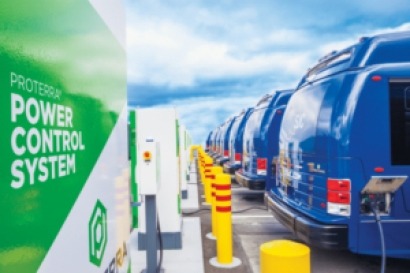
Using an independent third-party certification methodology for electric vehicle (EV) charging systems, the Green Bank’s project has resulted in the issuance of valuable carbon credits by Verra’s internationally recognized Verified Carbon Standard (VCS) Program.
The project was verified by third-party verification firm, SCS Global Services. The carbon credit proceeds are generated by the Green Bank’s project partners, which include large-scale utilities, small fast-growing charging networks, and telemetric-based start-ups, to strengthen the provision of their EV charging services.
The issuance of these EV charging carbon credits represents the Green Bank’s first entry into the carbon markets.
“This process has taught us how we can leverage carbon markets to unlock added revenue streams for ourselves and our partners. I expect us to examine where else we can be a participant in these markets, which will open doors for us both in terms of clean energy and environmental infrastructure,” said Eric Shrago, Vice President of Operations at the Green Bank.
The environmental benefits of these initial credits are the equivalent of removing 5,278 tons of carbon dioxide from the atmosphere, the equivalent of not burning 538,778 gallons of gas, or the carbon sequestered by 5,666 acres of U.S. forests for one year.
The minting of these very first EV charging credits proves the success of this public-private partnership model designed to ensure the vibrancy of the carbon market as applied to e-transportation and create low-fee access to such capital for smaller EV charging partners.
The transportation sector accounted for the largest portion (27%) of total U.S. greenhouse gas (GHG) emissions in 2020, according to the Inventory of U.S. Greenhouse Gas Emissions and Sinks 1990–2020. Efforts to create greater access to more efficient forms of transportation will decrease the sector’s environmental impact.
Carbon credits are a tool used to incentivize activities that lower carbon emissions, such as charging and driving electric vehicles. Organizations and individuals purchase these credits to invest in and support a lower carbon future, including offsetting their own carbon-intensive activities. Credits from this project stem from the usage of electrical vehicle charging enabled by consortium partners’ EV charging services.
These voluntary carbon market credits accelerate the deployment of EV charging services to help communities more rapidly achieve their low carbon transportation goals. As credits are sold, this transaction secures funding from the private carbon capital markets to help accelerate mission-critical low carbon technology deployment, which is complementary to the policies that states might otherwise adopt. EV charging carbon credits represent an innovative way to help accelerate the shift to electric transportation using private sector funds rather than public resources. Leading states have therefore appreciated the leadership that the Green Bank and its partners have brought to the challenge of funding and expanding EV charging infrastructure.
The Green Bank’s roster of project partners originally included EV charging pioneers Volta, U-Go Stations, which Blink Charging recently acquired, Proterra, and the EV Structure Company. The consortium’s partners have expanded to now include Dominion Energy, Exelon, Optiwatt, EV Match, BLINK, AmpUp, and OpConnect. Together, these partners already have 725 EV charging stations across the United States enrolled with the project. The project is now poised to expand dramatically in size and geographic scope.
“Dominion Energy is committed to reducing its carbon footprint and helping our customers do the same,” said Mark Webb, Senior Vice President and Chief Innovation Officer for Dominion Energy.
“We have an ambitious Green Fleet goal, with plans to electrify 75% of our passenger fleet by 2030. Partnering with the Connecticut Green Bank to secure EV charging carbon credits is an innovative way to help accelerate the transition to clean transportation.”

